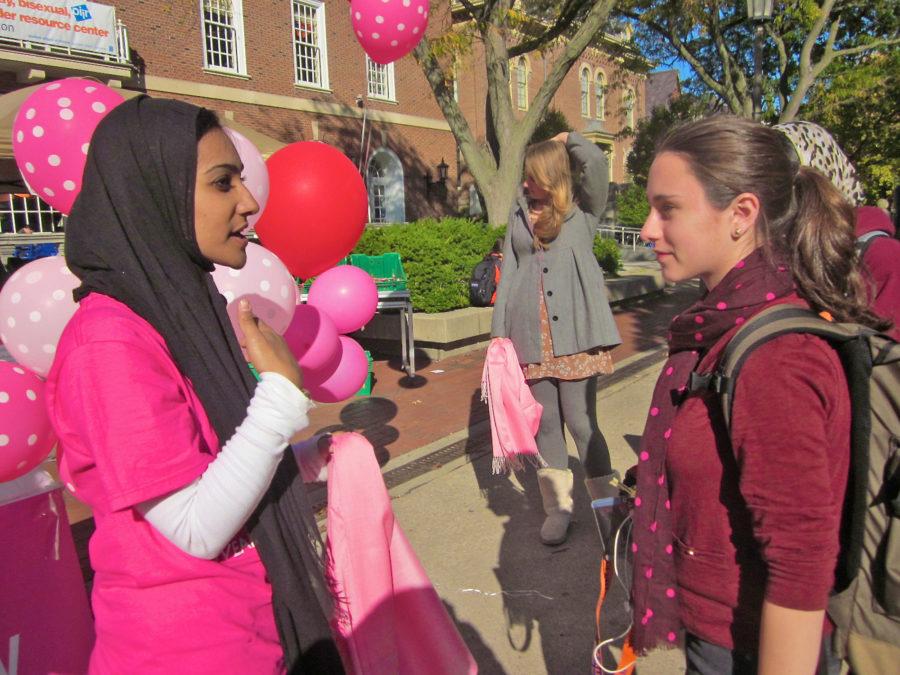Islamophobia shouldn't deter Muslim pride
December 7, 2015
In light of recent terrorist attacks, there’s a heightened sense of fear and an increased circulation of anti-Muslim rhetoric being perpetuated by both politicians and everyday citizens.
As stories about ISIS swamp major news outlets, it seems as if some people have begun pointing their fingers toward ordinary Muslim Americans in their neighborhoods, sometimes even creating unfounded accusations of bomb-making or terrorist involvement.
Perhaps for lack of a better education on this topic and limited exposure to certain minority groups, there is a notion being passed around within the western world that people who wear a hijab, grow their beards out and wear white topis are also suicide bombers.
Recently, we’ve had to hear stories more and more frequently about hate crimes being committed against Muslims in America and elsewhere in the western world.
During Thanksgiving dinner this past week, my aunts and uncles started talking about the recent bombings in Paris and what it means for us Muslims in America.
Get The Daily Illini in your inbox!
My aunt suggested to me that Muslim girls my age shouldn’t be wearing their hijabs outside because it welcomes unnecessary harassment. Instead, they should take off their hijabs and carry on like average American citizens, as this would be the best way to protect ourselves.
I can’t help but disagree. The best way to combat the wave of negative association with being Muslim is to stand our ground, exhibit pride in being Muslim Americans and show people that we are not terrorists.
People who are Muslim are students, doctors, taxi drivers, lawyers, cashiers and engineers. We are everyday Americans, which is oftentimes lost in the rhetoric of fear and hate flooding us by politicians and uninformed masses.
That said, my aunt’s concerns aren’t irrational. It’s difficult to embrace being a Muslim in today’s climate. Although more people today are realizing that Muslim does not equal terrorist, there still exists a faction of the public that is unaware or uneducated.
In Toronto, Ontario, two women wearing hijabs were harassed, pushed around and called terrorists by two men and a woman on the downtown subway. http://www.theglobeandmail.com/news/toronto/police-investigating-abusive-comments-made-toward-muslim-women-on-subway/article27362426/
A mosque in St. Petersburg, Florida was threatened last month when a man left a voicemail saying that he would “firebomb” Muslims and “shoot whoever’s there on sight in the head. I don’t care if they’re (expletive) 2 years old or 100.” http://www.tampabay.com/news/publicsafety/crime/fbi-investigating-attack-threat-against-st-petersburg-mosque/2254123
Because of incidents such as these, Muslims are becoming more and more afraid of attending prayers and practicing their religion because of the possibility that a gunman might show up to their place of worship or they might be accosted in the streets. These dangers exist; that is incontrovertible.
And it doesn’t help when a very prominent public figure in our country, Donald Trump, says at a political rally that Muslims in America should be documented in a database and forced to wear badges to identify themselves in public.http://www.cnn.com/2015/11/20/opinions/obeidallah-trump-anti-muslim/ Trump’s vision of Muslim IDs bear a ghostly resemblance to how the Star of David badges served Jews in prewar Germany.
Statements such as Trump’s only serve to further alienate people from Muslim Americans and push us further into worlds of intolerance and hatred. With dialog such as this, ordinary citizens will come to view Muslims and Americans with a dichotomy that suggests that the two are separate and unequal.
I recognize there are valid concerns for everybody’s safety, and I recognize that it’s a precarious time to be a Muslim in a western country. But especially during these times, it’s better to stand together in solidarity than to cower and hide for safety.
A commonality amongst the people who are spreading anti-Muslims statements is that they’re making generalizations about who Muslims are. It’s very likely that they don’t understand who Muslims in America actually are, and that’s why it is so important now to stand up for ourselves. Perhaps it’s idealistic, but I believe that the best way to fight for acceptance is to remain proud of ourselves.
Though it’s an obvious and worn-out statement, the actions of a few should not dictate the fates of the majority. People shouldn’t judge Muslims as a whole because of what radical extremists have done in the East.
Though I don’t wear the hijab for my own personal and spiritual reasons, I am a Muslim. And I was born in Chicago, I’ve gone to public schools and now I’m attending a state university. I am an American. My hope is that my fellow Americans might come to see that it is possible to be both.
Saba is a sophomore in Engineering.







